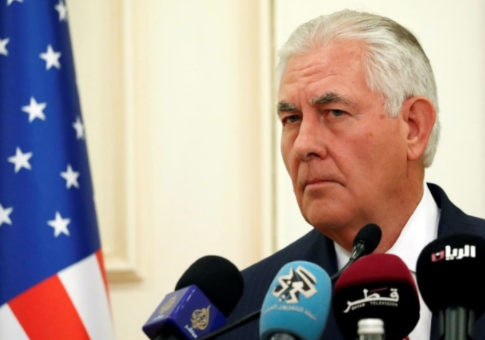By Jonathan Landay
BAGHDAD (Reuters) — U.S. Secretary of State Rex Tillerson made an unannounced visit to Baghdad on Monday, meeting Prime Minister Haider al-Abadi hours after his office accused Tillerson of interfering in Iraqi affairs.
It was Tillerson's second meeting with Abadi in as many days. After Sunday's meeting, alongside Saudi Arabia's King Salman, Tillerson said it was time for Iranian-backed militias that had helped Baghdad defeat Islamic State to "go home".
Abadi did not appear to share Tillerson's view.
"No party has the right to interfere in Iraqi matters," a statement from his office read. It did not cite the prime minister himself but a "source" close to him.
Washington, which also backed Baghdad against Islamic State, is concerned Iran will use its increased presence in Iraq, and in Syria where it supports President Bashar al-Assad, to expand its influence in the region.
Shi'ite Muslim Iran's influence in Iraq, where the population is also predominantly Shi'ite, has grown since the U.S. invasion of 2003 that overthrew dictator Saddam Hussein, a Sunni.
Iraq's Sunni Muslim neighbors, including Saudi Arabia, share Washington's concerns about rising Iranian influence.
Tehran has trained and armed the Iraqi Popular Mobilisation forces that have fought, often with Iraqi government units, against Islamic State which was effectively defeated in July when a U.S.-backed offensive captured its stronghold Mosul.
Neither party released details of Monday's meeting.
Tillerson was also due to meet Iraqi President Fuad Masum, a Kurd, in an apparent reaffirmation of U.S. support for unified Iraq after the Kurdish independence referendum held last month in northern Iraq.
The U.S. administration sided with Abadi in rejecting the validity of the vote which produced an overwhelming yes for Kurdish independence.
It also called the two sides to engage in a dialogue and to avoid further escalation, after Abadi retaliated to the vote by isolating the Kurdistan region and ordering his troops to seize the oil city of Kirkuk from Kurdish fighters.
The United States has over 5,000 troops deployed in Iraq, providing air and ground support to the offensive on Islamic State.
